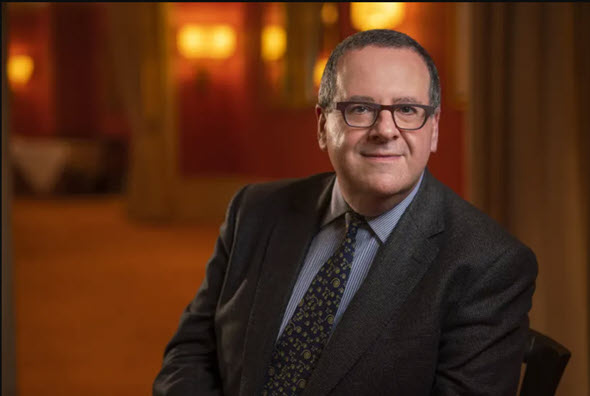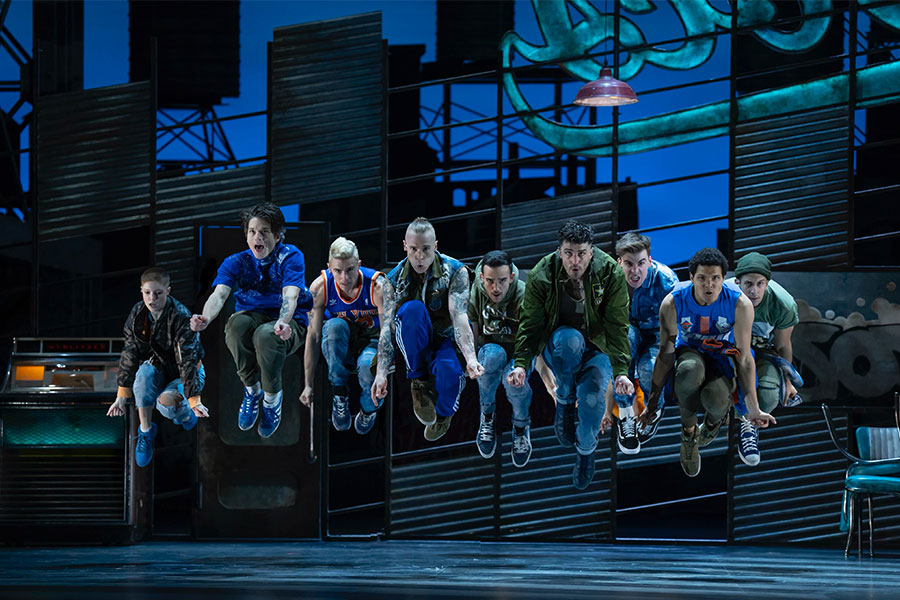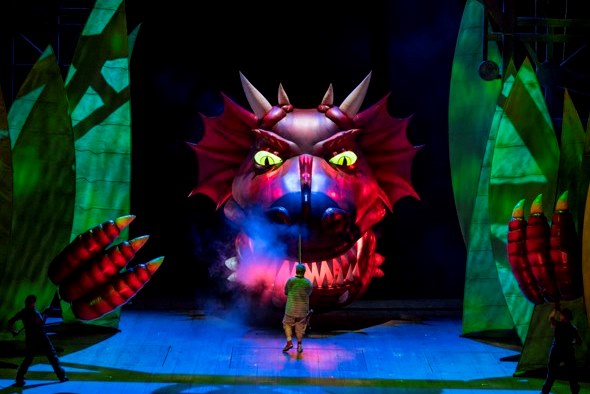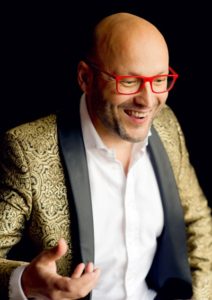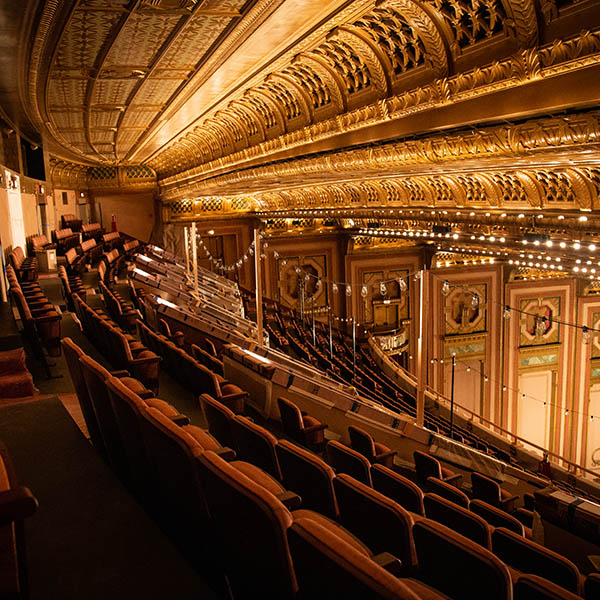As Lyric Opera emerges from challenging era, Anthony Freud winds up 13-year run at helm
Interview: ‘I think the work that we do is exciting, thought-provoking, innovative and surprising in many ways.’ says the exiting executive.
By Nancy Malitz
With Anthony Freud’s announcement that he will depart the Lyric Opera of Chicago as its general director in July of this year, a significant transition in one of the Windy City’s leading arts institutions is upon us.
“I feel great about the company, the strength of the institution from which I’m retiring,” said Freud at a recent sit-down interview in his office on the fourth floor of the Lyric Opera House. “I’m proud of the way we have evolved through challenging times. Even if you take the pandemic out of the mix, the world is changing from every point of view, and I feel that the Lyric Opera of 2024 is extremely fit for the purpose. I think the work that we do is exciting, thought-provoking, innovative, and surprising in many ways.”
Indeed, the Chicago arts scene is seeing big shifts in artistic leadership, shaking things up across a city that has nevertheless shown itself increasingly amenable to provocative treatments of classics:
Theater, film and TV director Edward Hall (son of Royal Shakespeare founder Peter Hall) has taken over as artistic director at Chicago Shakespeare, succeeding founding director Barbara Gaines. Hall’s first production in the new job was a “Richard III” out of the splatter-film genre, rich in chainsaws and gore, with Paralympic sprinter and double amputee Katy Sullivan as the murderously clever king. (Gaines herself directed “As You Like It” as a hippie-era romp in the woods, and she accompanied “King Lear” with the music of Frank Sinatra in consistently time-shifting investigations of 30 plays in the Bard’s canon since she founded the company in 1986.)
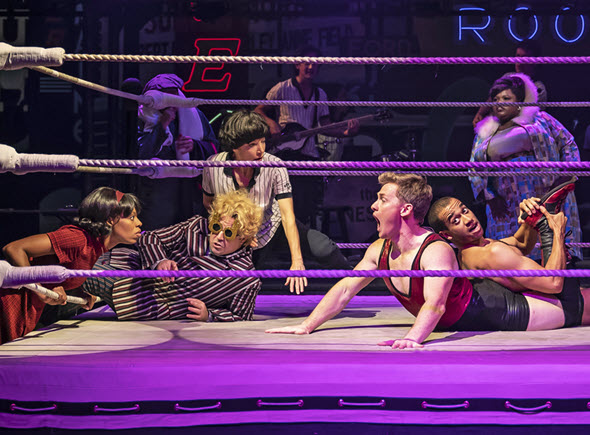
In this version of Shakespeare as comic smackdown, Rosalind’s eyes met Orlando’s in Chicago Shakespeare’s updated version of “As You Like It.” (Liz Lauren)
Even Riccardo Muti, after thirteen seasons as the Chicago Symphony Orchestra’s music director, transitioned to an emeritus role as of June 2023, with a new leader, soon to be announced, almost certainly decades younger. The overwhelming expectation is that 28-year-old conductor Klaus Mäkelä – or someone else by that name – will be announced as Muti’s successor around the time of the young Finn’s arrival to conduct Shostakovich’s 10th Symphony in early April. One of the pieces on that program is by Sauli Zinovjev, 36, who grew up playing guitar in a rock band.
If pushback regarding novel treatments of standards and new repertoire altogether has been a thread of complaint by some longtime Lyric buffs, Freud contends that “it’s not useful to regard our audience as monolithic. We have a huge quantity of raw data on the Lyric Opera audience. Some want a nostalgic journey down memory lane, revising works they’ve spent 50 years enjoying. Others have never experienced opera before and have no interest in coming to the opera house to see something they feel is outdated, archaic and has nothing to say to them. But they will come to something more likely to be exciting for them. The job of artistic planning is constantly striving to get the mix right.”
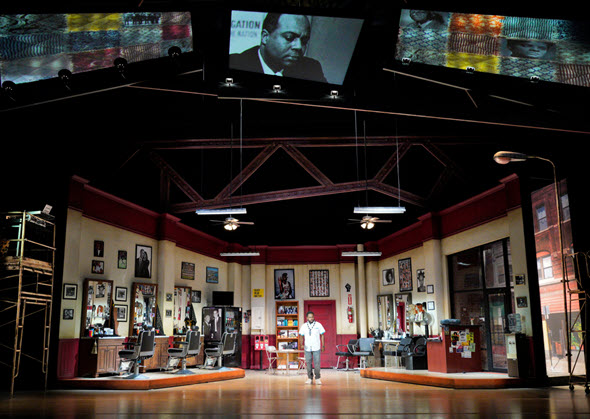
In this Lyric Opera spin-off of Rossini’s “The Barber of Seville,” baritone Will Liverman’s barbershop in a changing Chicago neighborhood is action central. The opera by Liverman and DJ King Rico premiered in the 2022-23 season. (Cory Weaver)
Lyric’s vigorous stirring of the operatic status quo in recent seasons is solidly of a piece with what has been given at the San Francisco Opera, the Metropolitan Opera, and companies in St. Louis and Detroit. The challenge these companies all face is how to serve their rapidly evolving art forms and current generations of music and theater lovers whose curiosity does not wane, but whose needs and interests may vary radically from the expectations of those who came before. Humans haven’t really changed so much, as any reading of the Greek classics will tell you. It’s good to be reminded in fresh ways.
“I arrived here 13 years ago with a passionate vision of the art form as real music theater,” said Freud at his office on the fourth floor of the Lyric Opera House, which was built in 1929 by the populist billionaire Samuel Insull in the style of Art Nouveau and Art Deco. The interior of the theater itself is stunningly gilded, the opera curtain a dazzling parade scene from ‘Aida.’ And the acoustics and sight lines, tweaked during Freud’s tenure, are ideal.
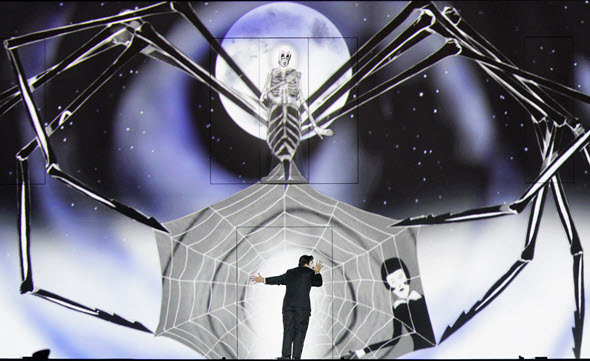
In 2021, Lyric presented Mozart’s “Tje Magic Flute” as if on a giant movie screen with pop-out notches for singers. (Cory Weaver)
“I don’t see a time when Lyric will not embrace the great historical pieces of the repertoire,” Freud insisted. “But how we present them has to be a reflection of the various contemporary lenses through which we see different issues today. There are very few inherited works that don’t create opportunities for reinvention, rediscovery. I actually love the idea of taking a great work of art that may be 200, 300 years old and subjecting it to interrogation. I think these operatic works of art are strong, tough. They withstand interrogation in an incredibly stimulating way.”
Among the changes instigated by Freud during his tenure: the Joffrey Ballet’s move from the Auditorium Theatre to the Lyric’s home, suggesting potential cross-pollination of the audiences; the transformative installation of a glass curtain in the lobby area as a guard against frigid winds, with the additional benefit of turning the grand lobby into a party scene; the increasing sophistication in the opera company’s digital offerings; its commissions of new work; and its presentation of Broadway musicals, shrewdly guided by Cory Lippiello, the company’s director of artistic programs, whose influence in casting, new commissions and related endeavors has been impactful.
“Great opera is a true fusion of great music and great theater; whatever we do, we strive to achieve that,” Freud argued. “As a cultural service provider to a great 21st century city like Chicago, it’s important the art form justifies that claim in the stories we tell, in the way in which we tell them, and in the artists of all disciplines whom we engage to perform those stories. I don’t like opera as a costumed concert that pretends to be theater.”
In hindsight, one could say that pushback from some longtime attendees was inevitable, particularly as to directors and physical sets that were chosen to radically update the locations, eras and circumstances of traditional operas. The Lyric’s subscribers hadn’t been fed much of that, although international crowds were lining up to come to Chicago for the company’s retelling of Wagner’s massive, four-evening Ring Cycle, which featured comic-book colors, and our hero Siegfried, in a striped T-shirt and short pants, getting his sword-forging kit by express mail, with “easy-to-assemble diagrams.” Siegfried’s nemesis, a fire-breathing monster, loomed over the stage as a brightly hued inflatable puppet.
The ideas piqued the curiosity of world travelers, for sure. But Lyric’s immense, four-part saga, which had promised to draw Ring enthusiasts from around the world, was shut down for good just as rehearsals for the final segment, “Götterdämmerung,” were about to begin on Friday, March 13, 2020. Instead, Freud walked onstage and told everyone to go home.
“That was an extraordinary, traumatic, emotional moment when we had to assemble everyone and inform them that the whole enterprise had to be terminated, barely three weeks before opening the final opera “Götterdämmerung” and the Ring cycle itself,” Freud recalled.
“But a company like this one can’t afford the self-indulgence to stay in mourning for too long. One of the decisions we made very early was that the last thing we could do was hibernate. We needed to be imaginative, creative, radical in working out how, in spite of this unprecedented experience, we could maintain connection with our audience and our donors and somehow navigate blind through what was to come. It was daunting. But I’m very proud of the work we did through that next year a half.”
Continuity at the Lyric will rely on music director Enrique Mazzolla, highly experienced in the classics of the opera repertoire, who recently signed on to remain with the company through the 2030-31 season. And plans that Freud has put in place will extend well beyond the current season; by virtue of their complexity, opera seasons are largely fixed years in advance.
“The breadth of cultural service that we now provide to the city is significantly greater than perhaps it had been, the way in which we have strived to be really relevant, the way we have strived to overcome some people’s preconceptions about the art form,” Freud said. “We are a world-class artistic organization that has in many ways demonstrated what it takes to be a great opera company in 2024.
“If you think of the new work we have commissioned in my time — whether it is ‘Proximity’ (a trio of Chicagoland stories) on the main stage, or mariachi opera, all the way through to chamber operas, and opera in the neighborhoods that we take to Chicagoland schools — all of that represents a surprising breadth of connection points for an ever-growing number of people.
“And we are unusual among North American opera companies in that we own our opera house. That is a huge asset, and it represents a huge opportunity. As we adapt to changing times, we need to understand how to maximize the benefit of this extraordinary resource in making people of all backgrounds feel welcome when they enter this place.
“But perhaps above all, I’m grateful every single day for the remarkable acoustic of our opera house. A singer coming onstage for the first time, looking into the Lyric auditorium, is panicking because it is so enormous, but when they open their mouths, suddenly they feel they’re embraced by a warm, cuddly friend. It’s a very easy place to sing in with the confidence that you can really play musically. It has 3,278 seats now. But in spite of its size, you can make real theater here. To me it’s mystical, beyond logic, but it works every time.”

